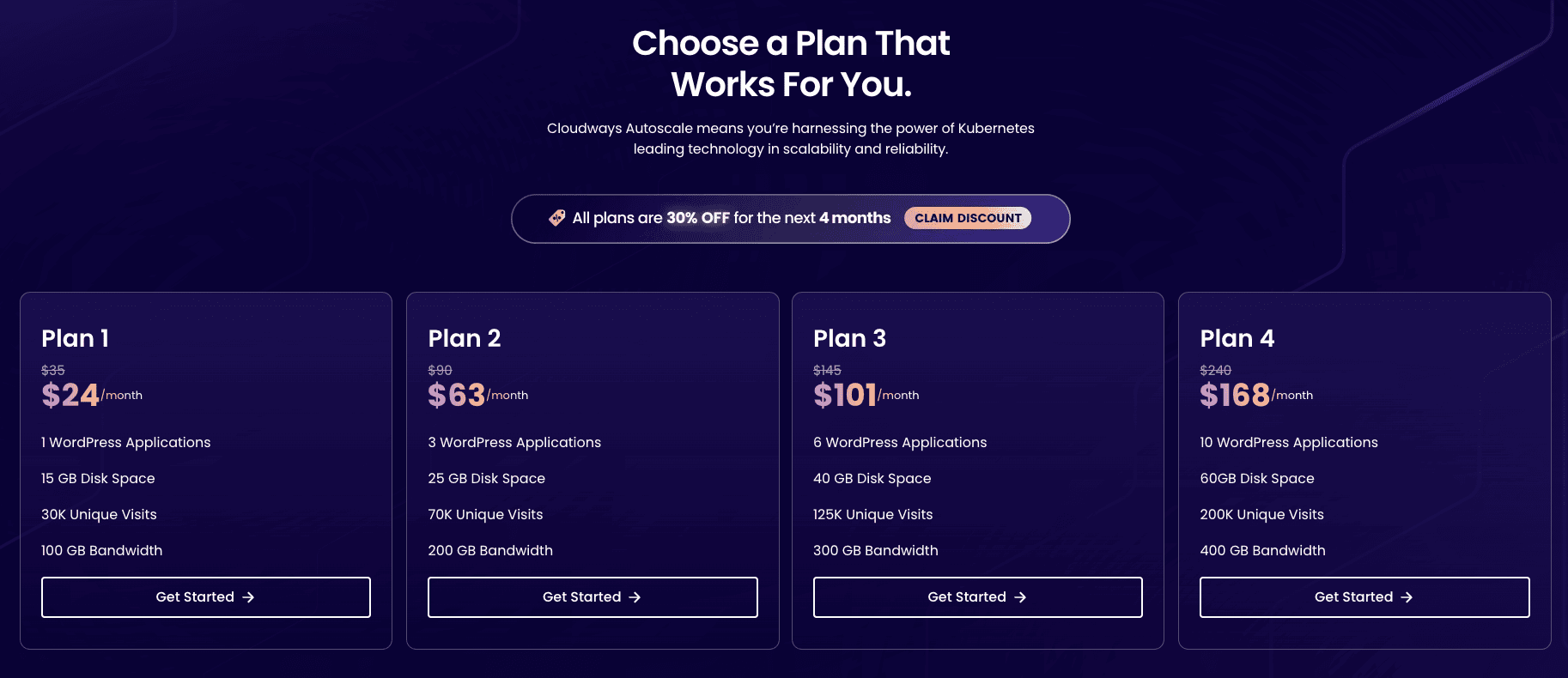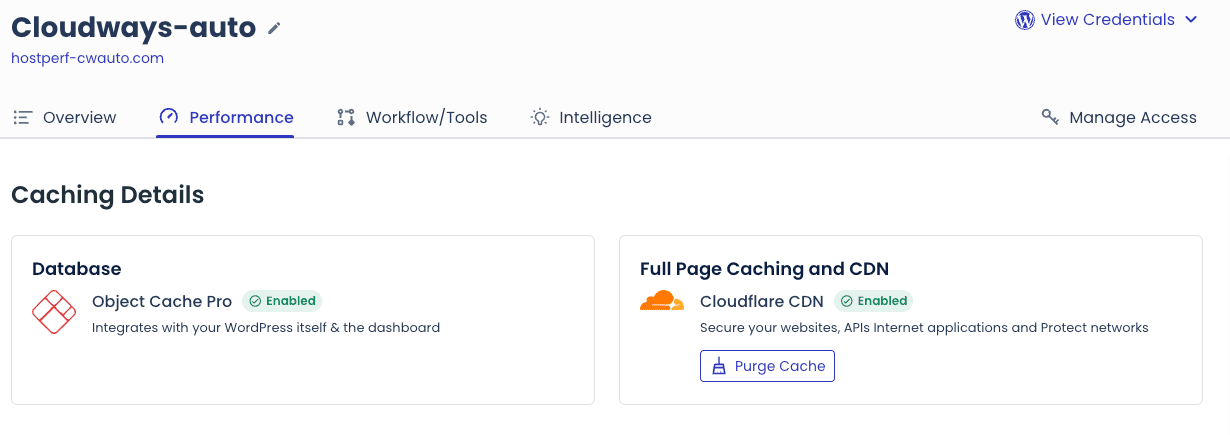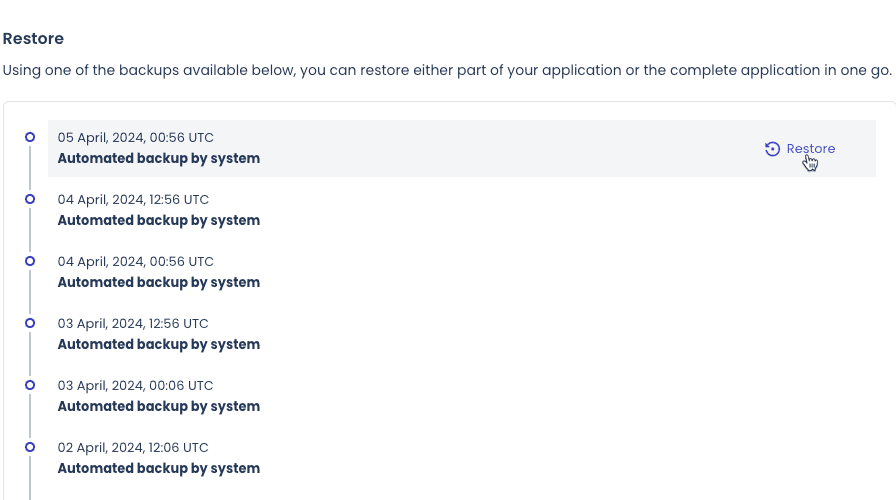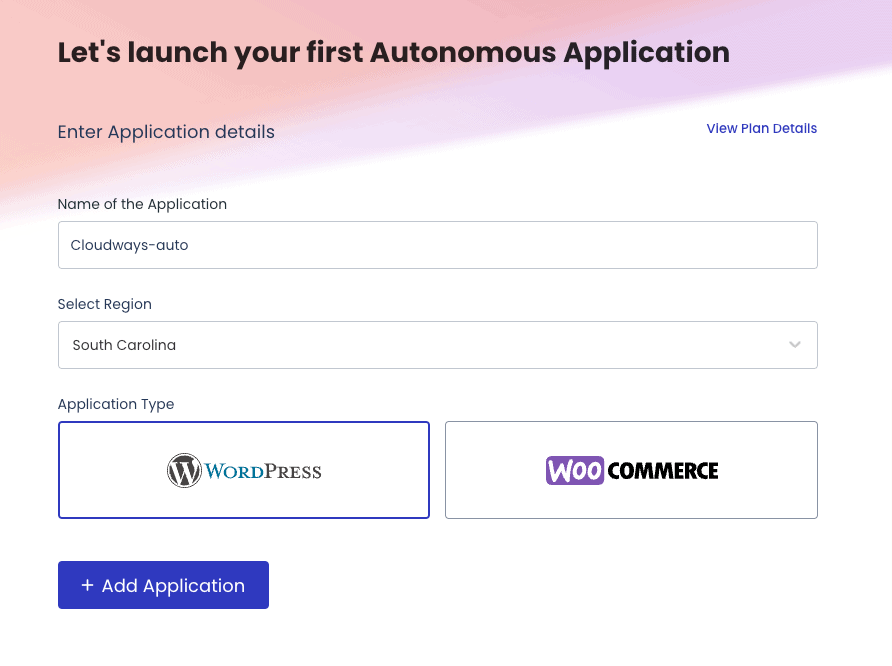Cloudways Autonomous Review 2025: Rated (9.0/10)
Cloudways Autonomous Hosting: Quick Overview
Cloudways Autonomous is the new high-availability WordPress hosting launched in 2024. With this plan, Cloudways is directly competing with WP Engine and Kinsta, which offer auto-scalable hosting solutions at the same price.
Performance Metrics
Pros
- Auto-Scaling
- Cloudflare Enterprise CDN
- Object Cache Pro
- Unlimited PHP Workers
Cons
- Limited data centers
- Premium-priced
- No phone support
- Limited plugin compatibility
Executive Summary: Is Cloudways Autonomous Right for You?
Cloudways Autonomous delivers exceptional performance with 20ms load handling, 358ms TTFB, and perfect 100% uptime. Built on Google Kubernetes Engine with Cloudflare Enterprise CDN and Object Cache Pro included, it’s an excellent choice for high-traffic WordPress sites needing reliable auto-scaling capabilities.
| User Type | Suitability Score | Key Consideration |
|---|---|---|
| Personal Blogs |
6.0
|
Premium pricing makes it overkill for most personal blogs unless they receive high traffic |
| Small Business |
7.0
|
Good value for businesses with growing traffic needs or seasonal spikes |
| eCommerce |
9.0
|
Auto-scaling and elite load handling make it perfect for handling traffic spikes during sales |
| Enterprise |
9.0
|
High-availability architecture on Google Kubernetes Engine with perfect uptime |
| Developers |
8.0
|
Comprehensive features like Object Cache Pro and staging without complex server management |
Key Differentiator
Powered by Google Kubernetes Engine (GKE), it offers features such as Cloudflare Enterprise CDN, Unlimited PHP workers, and Object Cache Pro.
In a Sentence
Cloudways Autonomous is an excellent choice for high-traffic WordPress sites needing reliable auto-scaling capabilities.
Our Testing Approach
At Hostingstep, We conduct long term testing to measure the real performance of web hosting companies. All hosts, including Cloudways Autonomous, go through five different testing protocols.
TTFB & Uptime Monitoring
- Tool: Pingdom synthetic monitoring
- Frequency: Every 60 seconds (525,600 checks/year)
- Locations: 22 North American regions
- Metrics: Response time (TTFB), uptime percentage
This continuous monitoring provides real-world performance over time, not just random testing time periods.
Load Testing
- Tool: Loader.io
- Protocol: 500 concurrent users over 60 seconds
- Metrics: Average response time, error rate
- Frequency: Monthly stress tests
These tests showcase how Cloudways Autonomous handles traffic spikes and whether it actually handles the load without any issues.
WPBenchmark Testing
- Tool: WPBenchmark plugin
- Metrics: CPU, memory, file system, database
- Scoring: Standardized 10-point scale
- Frequency: Quarterly benchmarks
These benchmarks evaluate the hardware performance of Cloudways Autonomous hosting.
Global TTFB Testing
- Tool: SpeedVitals
- Coverage: 40 worldwide locations
- Regions: North America, Europe, Asia, Australia
- Metrics: Region-specific response times
Got sites with international traffic? We test our Cloudways Autonomous test site from 40 global locations to see if they are fast enough for your visitors.
Standardized Test Environment
- Platform: WordPress with identical installs
- Theme: Twenty Twenty-Four
- Plugins: WP Fastest Cache, Rank Math, Contact Form 7
- PHP Version: 8.1 across all tests
All our test sites including Cloudways Autonomous are tested using the same test bench for fair comparisons.
Long-term Data Collection
- Duration: Minimum 12 months of testing
- Data Points: Over 500,000 tests per host
- Baseline: All hosts purchased independently
- Updates: Quarterly reviews of all metrics
We include standard 12-month data collected over a year (Mar 2024 – Mar 2025) of the previous year and latest Q1 (Jan – Mar) data for better performance identification.
The Hostingstep Difference
Unlike many review sites that rely on short-term unverifiable tests or affiliate relationships, our methodology-backed test bench setup ensures standardized performance data collection across all hosts including Cloudways Autonomous using our test sites. We independently purchase hosting accounts (access our invoices), deploy standardized test sites, and conduct performance monitoring 24/7, 365 days a year. This approach brings you the most accurate real-world performance data that users expect to know about the company.
Learn more about our testing methodologies:
Cloudways Autonomous Verified Performance Data
TTFB Response Time
Q1 2025: 379ms (Excellent)
43,800 data points from 22 locations
Uptime Performance
Q1 2025: 100% (Perfect)
0 mins downtime over 0 outages
Load Test Results
Testing Protocol: 500 concurrent users over 60 seconds
Error Rate: 0% (No errors)
Compared to Average: 90% faster than industry average
WPBench Score
Global TTFB
Performance Rating Scale
Cloudways Autonomous vs. Top Competitors
Based on Google search data, we’ve picked the following hosts which are constantly getting compared with Cloudways Autonomous. All performance metrics shown below were collected during the same 12-month period using identical WordPress test environments on similarly priced entry-level plans to ensure a fair comparison.
Performance Comparison
| Host | TTFB | Uptime | Load Test | Global TTFB | WPBench | Overall |
|---|---|---|---|---|---|---|
| Cloudways Autonomous |
358ms
|
100%
|
20ms
|
390ms
|
8.5/10
|
9.0 |
| WP Engine |
462ms
|
99.99%
|
19ms
|
293ms
|
5.9/10
|
8.5 |
| Kinsta |
437ms
|
100%
|
27ms
|
662ms
|
8.5/10
|
8.0 |
| Cloudways Flexible |
405ms
|
99.99%
|
128ms
|
444ms
|
3.7/10
|
7.8 |
| SiteGround |
608ms
|
99.94%
|
147ms
|
886ms
|
8.3/10
|
6.5 |
| Hostinger |
474ms
|
100%
|
256ms
|
503ms
|
8.0/10
|
7.2 |
Competitor Analysis Summary
Cloudways Autonomous outperforms most competitors in key metrics, especially in load handling with an exceptional 20ms response time under high traffic. Its perfect 100% uptime and excellent TTFB of 358ms make it a top contender in the premium WordPress hosting space.
Based on our comprehensive testing, here are the top alternatives to consider alongside Cloudways Autonomous:
WP Engine
WP Engine offers comparable load handling (19ms) and excellent global TTFB. Their longer track record in managed WordPress hosting provides more established customer support and feature maturity.
Visit WP EngineKinsta
Kinsta matches Cloudways Autonomous with 100% uptime and has equally impressive hardware benchmarks (8.5/10). Their load handling is strong at 27ms, making them a reliable alternative for high-traffic sites.
Visit KinstaCloudways Flexible
The standard Cloudways Flexible plan offers many of the same features at a lower price point, though without the auto-scaling capabilities and with slower load handling (128ms vs 20ms). A good option for lower traffic sites.
Visit Cloudways FlexibleNote: All hosting providers were tested with identical WordPress installations and configurations to ensure fair comparisons.
Key Differences Explained
The main difference between Cloudways Autonomous and competitors like WP Engine and Kinsta is the underlying architecture. Cloudways Autonomous is built on Google Kubernetes Engine (GKE), which provides superior scalability for handling traffic spikes without manual intervention. While all three offer managed WordPress hosting at similar price points, Cloudways Autonomous excels in load handling with its remarkable 20ms response time.
Another key distinction is the inclusion of Cloudflare Enterprise CDN, which would cost over $200/month if purchased separately. Both WP Engine and Kinsta include their own CDN solutions, but they don’t match the performance and security benefits of Cloudflare Enterprise. Additionally, Object Cache Pro comes standard with Cloudways Autonomous, providing efficient database query caching that significantly improves backend performance.
When to Choose Cloudways Autonomous Over Competitors
- Your site experiences unpredictable traffic spikes that require automatic scaling
- You want the performance benefits of Cloudflare Enterprise CDN included at no extra cost
- You need the database performance boost from Object Cache Pro
- You’re looking for the best load handling capability for high-traffic WordPress sites
When to Choose a Competitor
- WP Engine: If you prefer a longer established managed WordPress host with excellent global TTFB performance and more extensive customer support options
- Kinsta: If you want equally strong hardware performance with more data center location options and a more refined dashboard interface
- Other Alternatives: If budget is a concern, Cloudways Flexible offers many similar features at a lower price point, though without auto-scaling capabilities
Data sources: Performance metrics based on Hostingstep’s continuous monitoring over 12 months. Pricing information accurate as of March 2025.
Cloudways Autonomous Features and Pricing
Pricing Plans
- 1 WordPress application
- 15 GB Disk space
- 30K monthly visitors
- 100 GB Bandwidth
The pricing is on par with WP Engine and Kinsta, which have similar disk space and bandwidth limits. Cloudways slightly offers a higher 30k visitors compared to 25k visits on the other two managed hosts.

Key Performance Features
Google Kubernetes Auto-Scaling
Powered by Google Kubernetes Engine (GKE), Cloudways Autonomous automatically scales resources during traffic spikes. This ensures your site stays responsive even during unexpected surges in visitors.
Cloudflare Enterprise CDN
The Cloudflare Enterprise CDN comes pre-installed with full-page caching enabled by default. Cloudways also utilizes Cloudflare Enterprise for DDoS mitigation.

If you check on the Cloudflare official site, the Enterprise pack costs more than $200/month, but with Cloudways, we have a cost-saving approach.
Object Cache Pro
Object Cache Pro costs $79/month and helps optimize database queries. Cloudways includes this for free on all its plans. If you run a resource-hungry site, a powerful CDN like Cloudflare alone can’t help you at the front; powerful backend performance can only be offered with a service like Object Cache Pro.

Cloudways has a long history of working with Object Cache Pro on its previous plans, so the integration should speed up your backend performance. The data can be seen via the WordPress dashboard, and there is an option to manage it.
One-Click Staging
The staging environment is easy to set up with a one-click push and pull option. That means whatever changes you make in staging can be moved to the production site at one click and vice versa from production to pull.

I created a staging site with one click. Selecting Manage Environment takes you to staging site settings, where Push and Pull options appear.
Backup and Restore
Cloudways offers 14 days of backup and restore with an option to take manual backups when needed. I checked the logs and saw that the backups are created data-wise with an option to restore at a single click.

The process is simple: Hover over any of the dates, and the restore process starts after a few confirmations.
How to Set Up Cloudways Autonomous?
After purchasing your hosting plan, you can install the Cloudways Autonomous application by logging into the Cloudways control panel and clicking on Add Application.
The following screen will appear. Enter the application’s name and select your preferred data center region. Then, choose WordPress or Woocommerce and click on Add Application.

The setup is simple. In the next screen, you will get the Autonomous site with credentials, including login and password, auto-created. Click the Manage Access button, and the domain management will appear.
Enter the desired domain name, and a CNAME record will be generated. Enter the details in your DNS management tool, and the Autonomous site will be live.
There are four tabs to explore: Overview, Performance, Workflow/Tools, and Intelligence.
- Overview: You can access site details like location and PHP version. Scroll down to see the option to create a staging environment. Below that, you will get logs such as Total visits, disk space usage, and bandwidth. There is also a quick settings menu with access to SSH/SFTP, domain management, and database access.
- Performance: This tab gives access to Object Cache Pro and Cloudflare CDN settings.
- Workflow/Tools: Access to most common features like Backup/restore, PHP settings and Staging environment setup. We have explained all these settings in the features section above.
- Intelligence: This tab shows the logs and traffic analytics data.
How Does Pricing Compare to Competitors?
| Hosting Provider | Starting Price | Monthly Visits | Storage | Auto-Scaling | CDN |
|---|---|---|---|---|---|
| Cloudways Autonomous | $35/month | 30,000 | 15 GB | ✓ | Cloudflare Enterprise |
| WP Engine | $30/month | 25,000 | 10 GB | ✓ | Standard CDN |
| Kinsta | $35/month | 25,000 | 10 GB | ✓ | Kinsta CDN |
| Cloudways Flexible | $14/month | Unlimited | 25 GB | ✗ | Optional Add-on |
While Cloudways Autonomous is priced in the premium range alongside WP Engine and Kinsta, it offers more monthly visits allowance (30K vs 25K) and includes Cloudflare Enterprise CDN and Object Cache Pro built-in, providing excellent value for high-traffic sites that need reliable auto-scaling.
Cloudways Autonomous: Detailed Pros and Cons
What We Liked
Auto-Scaling Architecture
Powered by Google Kubernetes Engine (GKE), Cloudways Autonomous automatically scales resources during traffic spikes without manual intervention. This ensures your site stays online and responsive even during unexpected surges in visitors.
Exceptional Load Handling
With an impressive 20ms average response time under heavy load (500 concurrent users), Cloudways Autonomous outperforms most competitors in handling high traffic scenarios, making it ideal for high-traffic WordPress sites.
Cloudflare Enterprise CDN Included
The inclusion of Cloudflare Enterprise CDN (normally $200+/month) provides enterprise-grade performance and security benefits including full-page caching, advanced DDoS protection, and global content distribution at no additional cost.
Object Cache Pro Integration
Includes Object Cache Pro (valued at $79/month) for optimized database query caching, significantly improving backend performance for database-heavy WordPress sites and providing detailed cache analytics in the WordPress dashboard.
Perfect Uptime Record
Our 12-month monitoring showed a perfect 100% uptime without a single outage, demonstrating the exceptional reliability of the Google Kubernetes infrastructure and Cloudways’ management of the platform.
Limitations to Consider
Limited Data Center Options
Compared to competitors like Kinsta, Cloudways Autonomous offers fewer data center location options, which could impact websites owners targeting specific geographic regions not covered by their available data centers.
Premium Pricing
Starting at $35/month (with 30% off for the first 3 months), Cloudways Autonomous is positioned as a premium managed WordPress hosting solution. While the value is excellent, it may be outside the budget range for smaller websites or personal blogs.
Newer Service with Less Track Record
As a relatively new offering launched in 2024, Cloudways Autonomous doesn’t have the years-long track record of some competitors like WP Engine. This might be a consideration for those who prefer more established hosting solutions with proven long-term reliability.
Limited Advanced Developer Tools
While the platform offers good developer features, it lacks some of the advanced development tools and Git integration options that more developer-focused hosts like Kinsta provide in their standard offerings.
Support Response Times Can Vary
While Cloudways offers 24/7 support, some users report variable response times compared to the dedicated WordPress experts at specialized managed WordPress hosts. Complex issues may take longer to resolve than with hosts focused exclusively on WordPress.
Cloudways Autonomous: Final Verdict
Cloudways Autonomous delivers exceptional performance with 20ms load handling, 358ms TTFB, and perfect 100% uptime. Built on Google Kubernetes Engine with Cloudflare Enterprise CDN and Object Cache Pro included, it’s an excellent choice for high-traffic WordPress sites needing reliable auto-scaling capabilities.
The pricing is on par with WP Engine and Kinsta, which have similar disk space and bandwidth limits. Cloudways slightly offers a higher 30k visitors compared to 25k visits on the other two managed hosts. The inclusion of Cloudflare Enterprise and Object Cache Pro provides additional value that would cost hundreds extra per month if purchased separately.
While Cloudways Autonomous is a newer offering with some limitations in data center options and developer tools, its outstanding performance metrics and high-availability architecture make it one of the top contenders in the premium managed WordPress hosting space. For businesses experiencing traffic spikes or running resource-intensive WordPress sites, the auto-scaling capabilities alone justify the investment.
Key Takeaways
Elite performance with 20ms load handling and perfect 100% uptime
Auto-scaling on Google Kubernetes Engine handles traffic spikes without manual intervention
Includes Cloudflare Enterprise CDN and Object Cache Pro worth $280+/month
Premium pricing at $35/month is justified by the features and performance
Who Should Choose Cloudways Autonomous
- High-Traffic Websites that need reliable performance even during traffic spikes
- E-commerce Stores running WooCommerce that need to handle seasonal sales and promotions
- Media & News Sites with unpredictable traffic patterns and need for high availability
- Agency Clients requiring premium hosting with automatic scaling and enterprise-grade CDN
Who Should Look Elsewhere
- Personal Bloggers with low traffic who would be better served by more affordable options
- Small Business Sites with predictable, moderate traffic that don’t need auto-scaling
- Budget-Conscious Users who can’t justify the premium pricing for advanced features
- Developer-Focused Projects requiring extensive Git workflows and advanced development tools
Frequently Asked Questions About Cloudways Autonomous
We’ve compiled answers to the most common questions about Cloudways Autonomous based on our extensive testing and user feedback.
This review was last updated on March 24, 2025 based on our continuous testing.
Have a specific question not covered here? Contact our editorial team.

Mohan Raj is the founder of Hostingstep.com, where he oversees the independent testing of 25+ web hosting providers. He conducts 525,600+ performance tests per year across 60+ global locations to measure TTFB speed, uptime, load test, core web vitals, and hardware benchmarks. Each provider is tested using independently purchased hosting accounts, backed by verifiable data.
